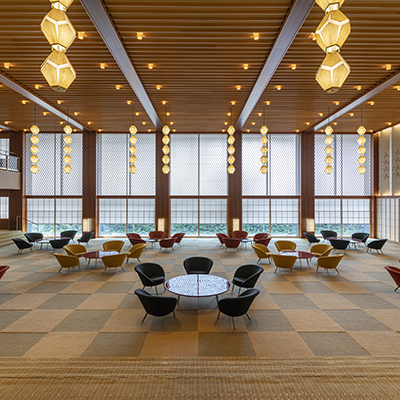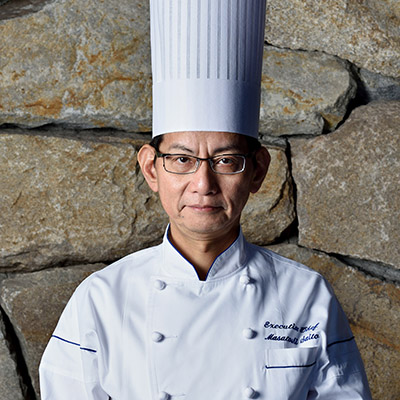October 12, 2020
Palace Hotel Tokyo
Experience the Heart of Japan
Palace Hotel Tokyo had its grand opening in May 2012, as a newly rebuilt hotel which blends traditional Japanese hospitality with the latest innovative fixtures. We talked to Executive Chef Masatoshi Saito and Chief Concierge Mayako Sumiyoshi.

What gala dinners, banquets, or receptions were particularly memorable for you?
When Éric Fréchon, of the three-starred Epicure in Paris, visited Japan, I was able to work with a three-starred chef for the first time. I got a closeup view of the latest Parisian tastes. The collaborative event with the Palace of Monaco and Palais de l’Élysée, to support recovery from the Great East Japan Earthquake, was also impressive. Above all, the tie-up event with the French film “Les Saveurs du Palais” is a particularly vivid memory. The film is an adaptation of the true story of Danièle Mazet-Delpeuch, the only female chef ever at the Élysée Palace. She was appointed by President François Mitterrand, who was known as a gourmet. After a screening of the film, we served dishes that had appeared in it. We didn’t have the recipes, so we tried over and over to make the dishes while watching the film scenes. It was challenging to adjust the classic dishes so that they would be good to eat, but it was a good experience. The most prestigious event was the banquet of 300 people for the Japan Prize by the Science and Technology Foundation of Japan, which was attended by the Emperor and Empress. Amid the kind of tension we never normally experience, we ran through repeated rehearsals to get ready for the day.As head chef, what do you emphasize above all?
We are a large-scale operation with many staff, so hygiene management and labor management are essential. Each work area has its own manager, but they have their hands full with the work in front of them, so I have the role of the overall coordinator. There are multiple cooking sections, so I value harmony between the various teams. Therefore, I go to the other kitchens on a daily basis to see what they’re doing, pick up and share the good things from each, and foster lateral communication.What do you take as important when preparing food?
Making food that is delicious, of course. Other than that, I pay particular attention to safety and not causing accidents. We get a wide variety of requests, in the restaurants and in banquets, and continuing to serve dishes that are safe, trusted, and satisfying tests our flexibility and responsiveness. I think we are more flexible than other hotels in that kind of thing.What are you doing for food diversity?
At the menu preparation stage, we have forms to fill out with information about weddings and hotel guests, and we share the information with related departments. For vegans, our all-day dining area displays the V Mark, and we are always ready to serve vegan food. For banquets, we take requests in discussions with our sales staff, and produce dishes in response that are nearly all made specially to order. Our breakfast buffet has items labeled as gluten-free. We cannot fully serve halal because we don't have a dedicated kitchen, utensils, or chef, but meat with the halal certification mark is always available in addition to some halal condiments. We are halal compliant in the sense that we can serve halal meat.The Olympics have been postponed to next year, but are you doing anything in particular to prepare for them?
What we do for the Olympics is just an extension of what we do every day. Delicious food is the norm, and beyond that, it’s important to be safe. The most important thing is to meet allergy-related, gluten-free, vegetarian, and other needs without incident.What does “omotenashi” mean to you?
Food stays in people’s memories and moves them. I think of it as one of the arts, alongside things like painting, sculpture, novels, and music. For example, a picture is persistent in the three-dimensional world, so it remains as a tangible form. Music heard at a live performance does not remain in a tangible form, but it remains in people’s hearts. Like music, food leaves no tangible form once it has been eaten, but it leaves feelings like “that was delicious” or “I want to go and eat that again”. Omotenashi to me means delivering that kind of art.
Why is the Palace Hotel Tokyo chosen by state guests?
Forbes awarded us five stars, and word of mouth from ambassadors to Japan and others spread our reputation. The location and security aspects are also important. Maintaining the Forbes five stars requires service with something extra. The extent to which we convey our hearts to our guests is important. For example, when introducing guests to a restaurant, it’s vitally important to be able to offer heartfelt suggestions that go a little bit further. Our ideal is to be a hotel that can do that naturally.What do you find challenging, satisfying, or enjoyable about welcoming foreign guests?
The guests who come to the concierge are 90% foreigners. In many cases, email correspondence starts half a year before they come to Japan, and can continue even after they go back to their countries. Coming into contact with guests from around the world requires study, and it’s an enjoyable work in which I can aspire to improve.One challenging thing is the abnormal increase in restaurants where people cannot make reservations. Sushi restaurants, in particular, have few seats, and many of them only serve their regulars, or have switched to online reservations, making it very difficult to get reservations.
Do you have any failure stories that you can talk about now?
Each restaurant has its own rules. For example, there is a famous sushi restaurant that doesn’t accept diners without collared shirts. At first there were no memos noting the necessary precautions, and one staff member forgot to tell a guest. The guest went to the restaurant in a collarless shirt and was told to change it. Now, we have guests accept and sign a precautionary note at the booking stage, before we make the booking. We have to imagine what could happen, and make arrangements accordingly. The restaurant situation in Japan differs from overseas, and we have to be particularly attentive in helping people who are visiting Japan for the first time. If we make sure they understand everything, they really come to like Japan. Some aspects are tough, but others are interesting.What are the differences between concierges in Japan and overseas?
Each country has different culture, regulations and concierge backgrounds. The way concierge handle guest requests are slightly different. But the feeling is the same anywhere, and making guests happy by serving them well is unchanging. What do Les Clefs d’Or members do?
The motto of Les Clefs d’Or is “Service through friendship”. Les Clefs d’Or assembles 500-600 members once a year to share information. In Japan, members gather once a month for a meeting or make visits to observe various places, as a way of deepening their own knowledge beyond hotel work. They use their own holidays to do that, so they have to like it. We visit places on the Kumano Kodo pilgrimage route, Naoshima Island, and places that want to attract more foreigners. On visits like that, we are often guided by people from local tourism associations, or the people in charge of welcoming visitors.What’s the most important thing?
Willpower, grit, taking care, and not giving up. You can’t do it without guts. I can set limits within myself in relating to inquiries, but my attitude is to go as far as it takes to delight our guests. For example, I have even looked for people in the past. I had a guest who wanted to meet his college roommate, so I decided to do some research based on the information I was given. At the end, I found the roommate and they reunited during the guest’s stay. It’s important to engage with the guest as much as possible, rather than setting limits on yourself.What is “true omotenashi”?
My motto is “Make a guest happy”. A concierge is a service associated with a hotel, and doesn’t have to exist. So why is the concierge there? Just to make a guest happy. How can we get closer to each individual and provide them with personal service? Even if staying at a hotel is good, it comes to nothing if the restaurant’s food doesn’t taste good or the service is bad. I think the challenge for any hotel is to connect with individual guests and serve them.








